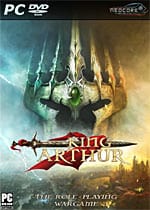Avalon Awaits
Neocore Games didn’t beat around the bush in coming up with an accurately descriptive title for King Arthur: The Role-Playing Wargame. The game beautifully blends some familiar and engaging war strategy genres into a powerful concoction that’s heavily steeped in Arthurian legend. The King Arthur mythos is ripe with fantastic subject matter and story elements to pluck from, and it’s seamlessly woven throughout the adventure in interesting ways. This epic and challenging quest to unite Britain by sword doesn’t disappoint, but you’re going to need some great fortitude to persevere in your righteous conquest.
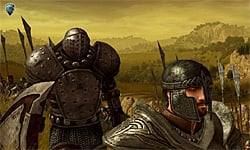
The son of the legendary Uther Pendragon, Arthur is prophesized to become the king of Britain and sets out with the magical blade of Excalibur to unite the many warring provinces in the country under one banner. Mythology and magic are as common as the sword and the shield in this vibrant fantasy realm, and the dualities between Paganism and Christianity provide different options for how you’ll ultimately shape your budding kingdom. As Arthur, you’re free to play the role of benevolent hero or brazen tyrant, and there are many crucial choices to face and decisions to make on your journey.
King Arthur’s core gameplay incorporates sprawling real-time battles with turn-based exploration and army management. Starting out on a peninsula with a meager force and little experience, you’ll forge ahead to grow in strength, capture territories, recruit new knights for your round table and soldiers to follow them, venture out on important quests, and engage in massive battles across the countryside. At a glance, many experienced strategy gamers will find it hard not draw inevitable comparisons to the Total War series. While there are some strong similarities between the games, particularly in the real-time combat system, King Arthur’s RPG elements and numerous other subtle nuances set it apart.
In the overworld map, you can move your armies across the hostile British landscape to capture settlements, check out quests, pick fights with nearby rulers, and hunt out allies. Turns cycle between the four seasons, and you only have a limited amount of movement and actions you can take in each. The warmer seasons are a prime time for battle and conquest, while all armies across the land button down for winter. This lull provides time to resupply and upgrade unit stats for armies that gained enough experience to level-up during the year. Resource-wise, you only have to worry about gold and food for your armies, which allows you to focus more on enjoyable tasks – like stamping out all who get in your path.
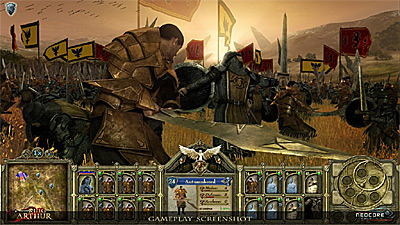
Prior to engaging in the chaos of war, you’re given a side-by-side rundown that compares your army with your opponent’s. This is helpful for gauging whether you’re likely to succeed in battle, but it’s not always possible to determine success from the numbers, since other factors like terrain, unit levels, special battlefield elements, and the makeup of each army make a difference. An auto-battle option offers instantaneous decisions in armed conflicts, though taking the time to manage your troops directly gives you a better chance at surviving.
Arthur can wield some helpful magic powers on the battlefield, like healing troops, providing morale boosts, and summoning a fog to provide cover from archers. He and the units under him all gain experience points from battle, and you can beef up their stats and in some cases pick new abilities when they level up. Armies can be made up of foot soldiers, pike men, horsemen, archers, and other key units, but the kinds of units you choose and how well you orchestrate them on the battlefield is very important. Some units are more effective against other types, and terrain plays a big role in combat effectiveness. King Arthur also adds some interesting additions, like hotspot locations on the battlefield that deliver special stat boosts when you’re within range or magic spells.
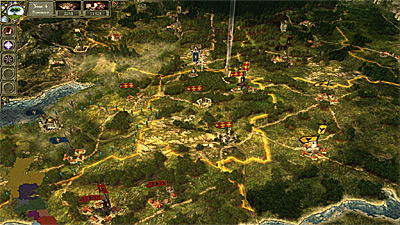
This large-scale combat is exciting and tense. Using all the tactical resources at your disposal gives you a lot of leeway to find winning strategies to take down enemy forces. The problem is it doesn’t take long for King Arthur’s steep difficulty curve to bite you in the backside. Even on the easiest difficulty setting, you’ll soon wind up railroaded into hard-to-avoid battle situations where you’re likely to get ground to a pulp no matter what your approach to combat or army management is. Losing Arthur or having too many of your forces whittled down spells an instant game over, forcing you to restart from a recent auto save. Depending on how you play, it’s easy to accidentally back yourself into a corner and have to backtrack in this manner. Otherwise, the game is really quite enjoyable.
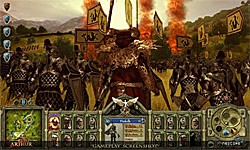
When you’re not trying to kill people, there are other activities to engage in. Quests bring up a choose-your-own adventure style interface that presents snippets of narrative and multiple options for what course of actions you want to take. You’ll have to run through a lengthy tree of these encounters before wrapping up a given quest. Some will have you spending money or food. Others will lead to battle. Ultimately, your decisions in these side excursions not only affect the outcome of a given quest, they can also have an impact on your troops, your religious leanings, the wheel of morality that tracks your deeds, and the vitality of your forces.
King Arthur has a polished, impressive overall presentation that features some marvelous artwork and a well-designed interface. Help menus that explain the various elements of gameplay pop up early on, though they’re not overly intrusive, and they actually have some style to them. On the map and in combat, the graphics look great on higher settings. The quick-zoom camera lets you get some truly cinematic views of the action, from a ground level perspective on the fighting to the standard eagle-eye view. Voice work and the soundtrack are also well done.
Though the extreme difficulty curve gives us some pause, King Arthur is an easy title to recommend. All of the various elements come together nicely with a gorgeous and stylish presentation. Neocore has already released a major patch to tweak some of the early issues, and their attentiveness to player feedback bodes well for the future of this engaging fantasy title.
RATING OUT OF 5 RATING DESCRIPTION 4.5 Graphics
An all-around great looking game, from the cool artwork and interface to the body-strewn battlefield. 3.9 Control
The zoom function is a bit testy, but the keyboard and mouse setup is pretty solid. 4.2 Music / Sound FX / Voice Acting
Nice voice work and appropriately thematic music. 4.0 Play Value
Lots of branching options and quests to explore. The grueling difficulty can be a drag. 4.3 Overall Rating – Great
Not an average. See Rating legend above for a final score breakdown.
Game Features:
